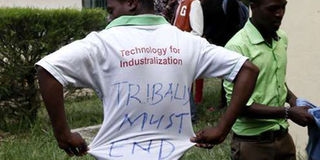Reject those advocating divisive ethnicity

Students at the Rift Valley Institute of Science and Technology in Nakuru protest on July 13, 2016. Tribalism is not a legacy worth bequeathing future generations for it does not have a place in our destiny. PHOTO | SULEIMAN MBATIAH | NATION MEDIA GROUP
What you need to know:
- In Kenya, politicians pour out tribal venom with the sole aim of benefiting from the aftermath of their words.
- The tribal coalitions that have recently sprung up across the country as voting blocs are not an improvement in inter-ethnic relations.
Ethnicity in Africa has been used by politicians to advance their selfish goals at the expense of cohesion.
In Kenya, politicians pour out tribal venom with the sole aim of benefiting from the aftermath of their words.
Too often, the ethnic card is played to stir up populism or score political points.
Issues that have little to do with ethnicity suddenly become politicised.
During electioneering, politicians exaggerate ethnic affiliations to create a presumption of kinship between tribesmen with the intention of building a position often advanced as “community interest”.
This should be of great concern to all Kenyans because when politicians exclusively use tribes as voting machines, space for other meaningful and progressive relations is closed.
This makes it impossible for Kenyans from different ethnic groups to forge a common identity.
The use or misuse of ethnicity as a political tool underlines our inability to attain nationhood after five-and-a-half decades of statehood.
The absence of nationhood in our country is not only a by-product of ethnic-based politics, it is also the cause of it.
The tribal coalitions that have recently sprung up across the country as voting blocs are not an improvement in inter-ethnic relations.
The formation of tribal alliances by key protagonists reveals their inability and lack of political will to create a genuine system of accommodation.
A tribal coalition is, indeed, an elevation of tribalism for it is principally centred on the exclusion of others.
POLITICAL INFLUENCE
In 2013, a coalition of the Rendille, Gabbra, and Burji, dubbed “Regabu”, guided the election of leaders in Marsabit county.
This later led to ethnic clashes. What happened in Marsabit holds lessons for all Kenyans.
While ethnicity is not conflictive and cannot, therefore, cause conflict, it becomes an instrument of war when ethnic attachments serve an individual’s selfish ends.
The 2013 conflict in Marsabit was not caused directly by ancient hatred and old feuds between the communities.
Rather, it was instigated by politicians. Indeed, the intermittent periods of peace in this multi-ethnic county suggest that diversity is not a problem.
One lesson that I believe is useful is that the appointment of individuals from the “excluded” groups to the county government, in compliance with the Constitution, does not constitute inclusion nor does it facilitate social cohesion and integration.
This is because the voting public can see through attempts to create illusions of inclusion instead of genuine efforts to foster long-term inter-ethnic harmony.
Therefore, we should all be wary of the consequences of failing to accommodate inter-ethnic diversity in our political processes.
While acknowledging that the politics of “us versus them” is deep-rooted and might take decades to uproot, it is vital that we try to change this.
FOR THE FUTURE
A story is told of a couple that lived during the American Revolution.
The woman wrote to her husband, who was at the warfront, asking: “What shall we tell our neighbours? Why is it that we do what we do, labouring to create a new society?”
His reply was: “You tell them that I study war, so that our children can study business, law, commerce, and invention, so that their children can study art, poetry and music.”
We have a responsibility to build a better society, not necessarily for us now, but as the birthright of our children’s children.
Tribalism is not a legacy worth bequeathing future generations for it does not have a place in our destiny.
We can build hope by uniting to reject all the political demagogues among us who want to use ethnicity to build their political careers.
Mr Dida is a technical and vocational education and training and skills development consultant. [email protected].




